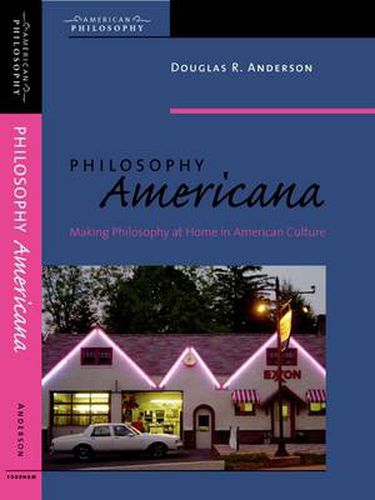Readings Newsletter
Become a Readings Member to make your shopping experience even easier.
Sign in or sign up for free!
You’re not far away from qualifying for FREE standard shipping within Australia
You’ve qualified for FREE standard shipping within Australia
The cart is loading…






In this engaging book, Douglas Anderson begins with the assumption that philosophy-the Greek love of wisdom-is alive and well in American culture. At the same time, professional philosophy remains relatively invisible.
Anderson traverses American life to find places in the wider culture where professional philosophy in the distinctively American tradition can strike up a conversation. How might American philosophers talk to us about our religious experience, or political engagement, or literature-or even, popular music?
Anderson’s second aim is to find places where philosophy happens in nonprofessional guises-cultural places such as country music, rock'n roll, and Beat literature. He not only enlarges the tradition of American philosophers such as John Dewey and William James by examining lesser-known figures such as Henry Bugbee and Thomas Davidson, but finds the theme and ideas of American philosophy in some unexpected places, such as the music of Hank Williams, Tammy Wynette, and Bruce Springsteen, and the writings
of Jack Kerouac.
The idea of philosophy Americana trades on the emergent genre of music Americana, rooted in traditional themes and styles yet engaging our present experiences. The music is popular but not thoroughly driven by economic considerations, and Anderson seeks out an analogous role for philosophical practice, where philosophy and popular culture are co-adventurers in the life of ideas. Philosophy Americana takes seriously Emerson’s quest for the extraordinary in the ordinary and James’s belief that popular philosophy can still be philosophy.
$9.00 standard shipping within Australia
FREE standard shipping within Australia for orders over $100.00
Express & International shipping calculated at checkout
In this engaging book, Douglas Anderson begins with the assumption that philosophy-the Greek love of wisdom-is alive and well in American culture. At the same time, professional philosophy remains relatively invisible.
Anderson traverses American life to find places in the wider culture where professional philosophy in the distinctively American tradition can strike up a conversation. How might American philosophers talk to us about our religious experience, or political engagement, or literature-or even, popular music?
Anderson’s second aim is to find places where philosophy happens in nonprofessional guises-cultural places such as country music, rock'n roll, and Beat literature. He not only enlarges the tradition of American philosophers such as John Dewey and William James by examining lesser-known figures such as Henry Bugbee and Thomas Davidson, but finds the theme and ideas of American philosophy in some unexpected places, such as the music of Hank Williams, Tammy Wynette, and Bruce Springsteen, and the writings
of Jack Kerouac.
The idea of philosophy Americana trades on the emergent genre of music Americana, rooted in traditional themes and styles yet engaging our present experiences. The music is popular but not thoroughly driven by economic considerations, and Anderson seeks out an analogous role for philosophical practice, where philosophy and popular culture are co-adventurers in the life of ideas. Philosophy Americana takes seriously Emerson’s quest for the extraordinary in the ordinary and James’s belief that popular philosophy can still be philosophy.